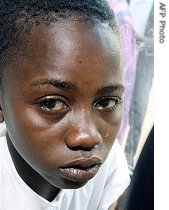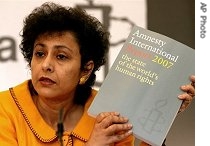2007年VOA标准英语-Amnesty Report Says Rights Situation in Africa(在线收听)
London
23 May 2007
Human rights watchdog Amnesty International launched its annual report for 2007 in London. The group says the 12 months covered again show gross human rights abuses on the African continent. Tendai Maphosa has more in this report from London.
Amnesty International describes the human rights situation in many parts of Africa as precarious during 2006. Its report listed armed conflict, underdevelopment, extreme poverty, widespread corruption, inequitable distribution of resources, political repression, marginalization, ethnic and civil violence, and the HIV/AIDS pandemic as factors undermining the enjoyment of human rights across the continent.

A boy, victim of child trafficking, cries in a mini van taking him back to his country in Aboisso, Ivory Coast, 22 Feb 2007
The report notes a decrease in armed conflict, but the downside is that many people are still affected, several million of these as refugees and internally displaced people, including children and the elderly who lack basic shelter, protection and care. Violence against women, especially in conflict situations, remains pervasive, the report notes.
The Sudanese government is still to be convinced to accept a U.N. peacekeeping force. An estimated 200,000 Darfuris have been killed and a further two million displaced during the conflict.
Speaking during the launch, Amnesty International Secretary-General Irene Khan blamed the United States and the international community for not putting enough pressure on the Sudanese government.
 |
| Irene Khan, Amnesty International's secretary- general, holds aloft a copy of the Amnesty International Report at a press conference in central London, 23 May 2007 |
Eritrea, Ethiopia, Rwanda, Sudan, Uganda and Zimbabwe are mentioned as some of the countries where a licensing system is used to restrict the work of journalists and curtail freedom of expression. Khan said journalists and others are on the forefront of the fight against human rights abuses.
"Journalists, writers, trade unionists, activists, human rights defenders are today the strongest and most courageous champions of human rights and they are paying a heavy price from Afghanistan to Zimbabwe," she said.
Tawanda Hondora is Amnesty International's Deputy Program Director for Africa. VOA asked him if there are any positive signs regarding human rights in Africa.
"Well there are in terms of international justice for instance, there have been initiatives to ensure that there is an end to impunity Hissen Habre the former president of Chad may face trial in Senegal; we have Thomas Lubonga, a warlord from the DRC [Congo] who was indicted by the International Criminal Court; we have Charles Taylor who was indicted again by the special court of Sierra Leone there are some positive signals," he said.
Hondora went on to say that, while these are tiny glimmers of hope, there is still a lot to do in terms of governments translating the human rights laws on just about every African country's constitution into practice.